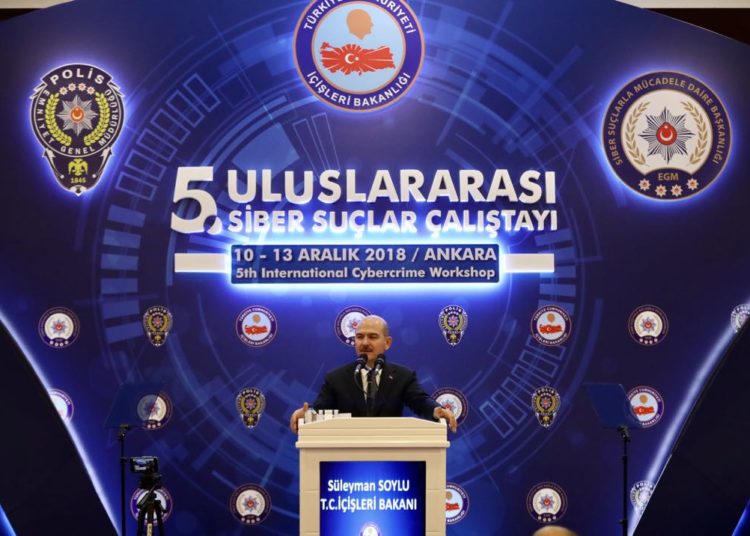Nordic Monitor
Secret documents obtained by Nordic Monitor have exposed illegal cyber operations by the government of Turkish President Recep Tayyip Erdoğan to suppress critical journalists who are living in exile in Sweden.
A review of the government documents shows that tweets from journalists resident in Sweden and articles published by Nordic Monitor, a Swedish-based media outlet, were listed as evidence of terrorism and coup plotting and that Turkish police conducted cyber-attacks and some kind of malicious cyber activity that posed significant threats to freedom of the press and the safety of journalists in exile.
The police report on the social media activities of Levent Kenez and Murat Çetiner, two of the founders of the Stockholm-based non-profit organization Nordic Research and Monitoring Network (NRMN), which owns Nordic Monitor, was conveyed by Özgür Karlıtepe, head of the anti-cybercrime unit in the İstanbul Police Department, on June 19, 2019 to the counterterrorism unit of the same department.
NRMN runs the NordicMonitor.com news website, which presents exclusive news on security, diplomacy, intelligence and military matters with a special focus on religious, ideological and ethnic extremist movements in Turkey.

The report was then sent on July 22, 2019 to the İstanbul 14th High Criminal Court in a secret communiqué by Gökhan Nazlım, head of the counterterrorism unit. The court was urged to use the report as evidence in case No. 2017/2 against Çetiner, which is based on fabricated terrorism charges. The unit followed the same procedure for Kenez and forwarded the document to the high criminal court via separate correspondence.
Nordic Monitor previously reported on a document that claimed NRMN was part of a terrorist organization, disclosing how the Turkish Foreign Ministry has spied on its founders, who were forced to flee due to their critical stance on Erdoğan’s oppressive regime. The new documents indicate that their social media messages condemning the coup attempt and articles investigating the Turkish government’s link to terrorist groups have been used in criminal cases against them.
The report revealed that the cybercrime unit of the İstanbul Police Department tried to hack into the email and social media accounts of Çetiner and Kenez. Using Twitter’s password retrieval option, the police traced their email accounts. The police then attempted to hack their Twitter accounts using the linked emails and phone numbers.
In the police report Çetiner and Kenez were accused of terrorism and coup plotting, while tweets questioning the official rhetoric for a failed coup on July 15, 2016, which many believe was a false flag orchestrated by Erdoğan himself to set up the opposition for mass persecution, were considered to be support for the coup attempt. In Turkey reporting on the coup attempt was curtailed by successive legal measures, and journalists who shed light on the abortive putsch were jailed.
The anti-cybercrime unit defined tweets about the corruption scandal in 2013 as an act of terrorism. Moreover, the unit listed social media posts regarding a police investigation into Quds Force operations in Turkey, listed as a terrorist organization by Turkey, as evidence of terrorism. The investigation exposed Erdoğan’s secret ties to Iran’s Islamic Revolutionary Guard Corps (IRGC) generals and uncovered how Turkey’s National Intelligence Organization (MIT), run by pro-Iranian figure Hakan Fidan, worked with the Iranian regime. The İstanbul prosecutors’ investigation file No. 2011/762, which was opened in 2010, was hushed up by Erdoğan in January 2014.
The Nordic Monitor article that reported on the Turkish court decision to free a wanted Islamic State in Iraq and the Levant (ISIL) suicide bomber was also incorporated into the case file as criminal evidence.
The goal of these cyber operations and fabricated terrorism charges against NRMN and its founders is to sustain its campaign of intimidation to silence critical voices beyond Turkish borders and create a chilling effect for those who still continue writing and speaking against Erdoğan.

The police report described how the cybercrime unit of the İstanbul Police Department attempted to hack into the email and social media accounts of Çetiner and Kenez.
In Turkey, over half a million people affiliated with the Gülen movement have been put in detention facilities on fabricated terrorism charges in the aftermath of the coup attempt. Since 2016 more than 130,000 civil servants have been dismissed by the government with no effective judicial or administrative investigation, 4,560 of whom were judges and prosecutors and were replaced by pro-Erdogan staff. As a result of the massive purge, the Turkish judiciary and law enforcement authorities have become tools in the hands of the Islamist government of President Erdoğan. The criminal justice system has often been abused by Erdoğan to persecute government critics, leading to the imprisonment of 176 journalists, a world record. Some 180 critical media outlets were seized and shut down by the government in 2016, while many news websites were blocked in Turkey.

NRMN’s executive director is Abdullah Bozkurt, a veteran Turkish journalist who was forced to move abroad in 2016 to escape the Erdoğan government’s crackdown on freedom of the press in Turkey. He is also facing multiple arrest warrants on a series of fabricated charges ranging from terrorism to defamation of Erdoğan through his critical writings.
Kenez, another journalist in exile who used to run the national Meydan daily as editor-in-chief before fleeing abroad, serves as deputy executive director of NRMN. Çetiner had worked for the United Nations and the Organisation for Security and Co-operation in Europe (OSCE) as independent expert on various assignments. He has a master’s in communications and had worked for 18 years with the Turkish police in various capacities, specifically in counterterrorism. Çetiner advises NRMN on security issues.













